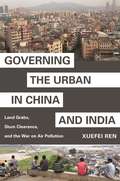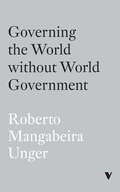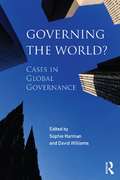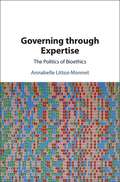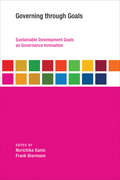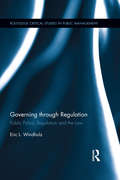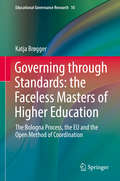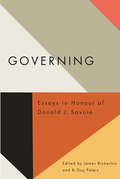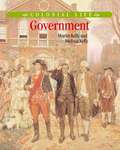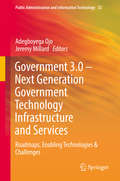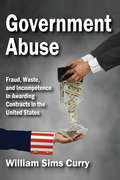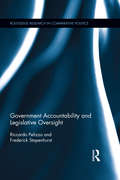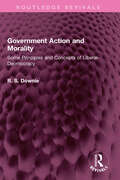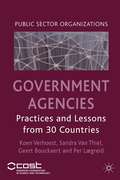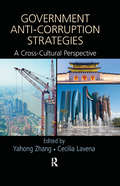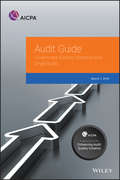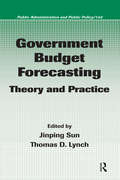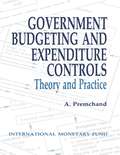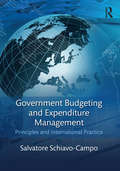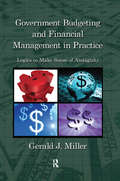- Table View
- List View
Governing the Urban in China and India: Land Grabs, Slum Clearance, and the War on Air Pollution (Princeton Studies in Contemporary China #10)
by Xuefei RenAn in-depth look at the distinctly different ways that China and India govern their cities and how this impacts their residentsUrbanization is rapidly overtaking China and India, the two most populous countries in the world. One-sixth of humanity now lives in either a Chinese or Indian city. This transformation has unleashed enormous pressures on land use, housing, and the environment. Despite the stakes, the workings of urban governance in China and India remain obscure and poorly understood.In this book, Xuefei Ren explores how China and India govern their cities and how their different styles of governance produce inequality and exclusion. Drawing upon historical-comparative analyses and extensive fieldwork (in Beijing, Guangzhou, Wukan, Delhi, Mumbai, and Kolkata), Ren investigates the ways that Chinese and Indian cities manage land acquisition, slum clearance, and air pollution. She discovers that the two countries address these issues through radically different approaches. In China, urban governance centers on territorial institutions, such as hukou and the cadre evaluation system. In India, urban governance centers on associational politics, encompassing contingent alliances formed among state actors, the private sector, and civil society groups. Ren traces the origins of territorial and associational forms of governance to late imperial China and precolonial India. She then shows how these forms have evolved to shape urban growth and residents’ struggles today.As the number of urban residents in China and India reaches beyond a billion, Governing the Urban in China and India makes clear that the development of cities in these two nations will have profound consequences well beyond their borders.
Governing the Use-of-Force in International Relations
by Ingvild Bode Aiden WarrenThis book examines US recourse to military force in the post-9/11 era. In particular, it evaluates the extent to which the Bush and Obama administrations viewed legitimizing the greater use-of-force as a necessary solution to thwart the security threat presented by global terrorist networks and WMD proliferation.
Governing the World Without World Government
by Roberto Mangabeira UngerHumanity faces grave dangers that can be avoided only by international cooperationThe world does not need a world government to govern itself. Roberto Mangabeira Unger argues that there is an alternative: to build cooperation among countries to advance their shared interests. We urgently need to avert war between the United States and China, catastrophic climate change, and other global public harms. We must do so, however, in a world in which sovereign states remain in command.The opportunity for self-interested cooperation among nations is immense. Unger shows how different types of coalitions among states can seize on this opportunity and avoid the greatest dangers that we face. Unger offers a way of thinking about international relations as well as a transformative program: a realism with hope and a way to develop the international diversity that we want without the international anarchy that we fear. His ideas challenge the disillusionment and fatalism that threaten to overwhelm us.
Governing the World?: Cases in Global Governance
by Sophie Harman and David Williams‘Global governance’ has become a key concept in the contemporary study of international politics, yet what the term means and how it works remains in question. Governing the World: Cases in Global Governance takes an alternative approach to understanding the concept by exploring how global governance works in practice through a set of case studies on both classical issues of international relations such as security, labour and trade, and more contemporary concerns such as the environment, international development, and governing the internet. The book explores the processes, practice and politics of global governance by taking a broad look at issues of human rights governance and focusing on detailed aspects of a topic such as torture and rendition to help explain how governance does, or does not, work to students and researchers of international politics alike. Bringing together a diverse and international group of scholars, each chapter responds to a set of questions as to what is being governed, how and who by and offers issue-specific case studies and recommended reading to develop a full understanding of the issue explored and what it means for global governance.
Governing through Expertise: The Politics of Bioethics
by Annabelle Littoz-MonnetLittoz-Monnet provides a fresh analysis of the enmeshment of expert knowledge with politics in global governance, through a unique investigation of bioethical expertise, an intriguing form of 'expert knowledge' which claims authority in the ethical analysis of issues that arise in relation to biomedicine, the life sciences and new fields of technological innovation. She makes the case that the mobilisation of ethics experts does not always arise from a motivation to rationalise governance. Instead, mobilising ethics experts - who are endowed with a unique double-edged authority, both 'democratic' and 'epistemic' - can help policy-makers manoeuvre policy conflicts on scientific and technological innovations and make their pro-science and innovation agendas possible. Bioethical expertise is indeed shaped in a political and iterative space between experts and those who do policy. The book reveals the mechanisms through which certain global governance narratives, as well as the types of expertise they rely on, remain stable even when they are contested.
Governing through Goals: Sustainable Development Goals as Governance Innovation (Earth System Governance)
by Frank Biermann Norichika KanieA detailed examination of the UN's Sustainable Development Goals and the shift in governance strategy they represent.In September 2015, the United Nations General Assembly adopted the Sustainable Development Goals as part of the 2030 Agenda for Sustainable Development. The Sustainable Development Goals built on and broadened the earlier Millennium Development Goals, but they also signaled a larger shift in governance strategies. The seventeen goals add detailed content to the concept of sustainable development, identify specific targets for each goal, and help frame a broader, more coherent, and transformative 2030 agenda. The Sustainable Development Goals aim to build a universal, integrated framework for action that reflects the economic, social, and planetary complexities of the twenty-first century. This book examines in detail the core characteristics of goal setting, asking when it is an appropriate governance strategy and how it differs from other approaches; analyzes the conditions under which a goal-oriented agenda can enable progress toward desired ends; and considers the practical challenges in implementation.ContributorsDora Almassy, Steinar Andresen, Noura Bakkour, Steven Bernstein, Frank Biermann, Thierry Giordano, Aarti Gupta, Joyeeta Gupta, Peter M. Haas, Masahiko Iguchi, Norichika Kanie, Rakhyun E. Kim Marcel Kok, Kanako Morita, Måns Nilsson, László Pintér, Michelle Scobie, Noriko Shimizu, Casey Stevens, Arild Underdal, Tancrède Voituriez, Takahiro Yamada, Oran R. Young
Governing through Regulation: Public Policy, Regulation and the Law (Routledge Critical Studies in Public Management)
by Eric WindholzOver the past forty years, numerous theoretical advances have been made. From Ayres’ and Braithwaite’s ground breaking work on ‘responsive regulation’, we have seen models of ‘smart regulation’, ‘regulatory governance’ and ‘regulatory capitalism’ emerge to capture the growing prevalence and importance of regulation in modern liberal Western capitalist societies. Important advances also have been made in the practice of regulation, with regulators evolving from traditional enforcement focussed ‘command and control’ models to being ‘modern regulators’ with a suite of diverse and innovative regulatory tools at their disposal. The book presents and critically examines these theoretical and practical developments from the perspective of governments who design regulations, and the regulators that deploy them. In doing so, the book examines the various forces and interests that influence and shape the regulatory endeavour, and the practical challenges facing governments and regulators when deciding whether and how to regulate. This volume is a study of regulation in context: in the context of the public policy it is designed to deliver; the law that enables, shapes and holds it to account; and the evolving societal and institutional frameworks within which it takes place. Aimed to provide innovative cross-disciplinary conceptual frameworks that regulators, regulatees, those whom regulation is intended to benefit, and academics, might employ to better understand and undertake the regulatory endeavour. This will be of great interest to researchers, educators, advanced students and practitioners working in the fields of political science, public management and administration, and public policy. .
Governing through Standards: The Bologna Process, the EU and the Open Method of Coordination (Educational Governance Research #10)
by Katja BrøggerThis book offers an empirical and theoretical account of the mode of governance that characterizes the Bologna Process. In addition, it shows how the reform materializes and is translated in everyday working life among professors and managers in higher education. It examines the so-called Open Method of Coordination as a powerful actor that uses “soft governance” to advance transnational standards in higher education. The book shows how these standards no longer serve as tools for what were once human organizational, national or international, regulators. Instead, the standards have become regulators themselves – the faceless masters of higher education. By exploring this, the book reveals the close connections between the Bologna Process and the EU regarding regulative and monitoring techniques such as standardizations and comparisons, which are carried out through the Open Method of Coordination. It suggests that the Bologna Process works as a subtle means to circumvent the EU’s subsidiarity principle, making it possible to accomplish a European governance of higher education despite the fact that education falls outside EU’s legislative reach. The book’s research interest in translation processes, agency and power relations among policy actors positions it in studies on policy transfer, policy borrowing and globalization. However, different from conventional approaches, this study draws on additional interpretive frameworks such as new materialism.
Governing with Words
by Gillion Daniel Q.Rather than considering political discussions and rhetoric as symbolic, inconsequential forms of politics, Governing with Words conceptualizes them as forms of government action that can shape institutions and societal norms. Daniel Q. Gillion refers to this theory as 'discursive governance'. Federal politicians' statements about racial and ethnic minority concerns aid the passage of minority public policies and improve individual lifestyle behaviors. Unfortunately, most of the American public continues to disapprove of politicians' rhetoric that highlights race. The book argues that addressing racial and ethnic inequality continues to be a tug-of-war between avoiding the backlash of the majority in this nation while advocating for minority interests. Even though this paradox looms over politicians' discussions of race, race-conscious political speech, viewed in its entirety, is the mechanism by which marginalized groups find a place in the democratic process. Such race-conscious discussions, the book argues, have ramifications both within and outside of government.
Governing: Essays in Honour of Donald J. Savoie
by B. Guy Peters James BickertonTo honour the distinguished career of Donald Savoie, Governing brings together an accomplished group of international scholars who have concerned themselves with the challenges of governance, accountability, public management reform, and regional policy. Governing delves into the two primary fields of interest in Savoie's work - regional development and the nature of executive power in public administration. The majority of chapters deal with issues of democratic governance, particularly the changing relationship over the past thirty years between politicians and public servants. A second set of essays addresses the history of regional development, examining the politics of regional inequalities and the promises and pitfalls of approaches adopted by governments to resolve the most vexing policy problems. Contributors provide readers with a valuable primer on the key issues that have provoked debate among practitioners and students of government alike, while reflecting on government initiatives meant to address inadequacies. Showcasing the practical experience and scholarly engagement of its authors, this collection is a valuable addition to the fields of public administration, public policy, political governance, and regional policy. Contributors include Peter Aucoin (Dalhousie University), Herman Bakvis (University of Victoria), James Bickerton (St Francis Xavier University), Jacques Bourgault (École nationale d'administration publique/UQAM), Thomas Courchene (Queen's University), Ralph Heintzman (University of Ottawa), Mark D. Jarvis (University of Victoria), Lowell Murray (Senate of Canada, retired), B. Guy Peters (University of Pittsburgh), Jon Pierre (University of Gothenburg) Mario Polèse (INRS-UCS), Christopher Pollitt (Leuven University), Donald J. Savoie (Université de Moncton), and Paul G. Thomas (University of Manitoba).
Government
by B. TravenB. Traven's magnum opus was a six-volume work of historical fiction recounting the Mexican revolution of 1910. "Government" sets the scene by describing the plight of the indigenous peoples who were ruthlessly exploited by a government completely corrupt at every level from the presidency to the village "secretaries".
Government (Inside Ancient China Ser.)
by Melissa Kelly Martin KellyFirst Published in 2015. Routledge is an imprint of Taylor & Francis, an Informa company.
Government 3.0 – Next Generation Government Technology Infrastructure and Services
by Adegboyega Ojo Jeremy MillardHistorically, technological change has had significant effect on the locus of administrative activity, cost of carrying out administrative tasks, the skill sets needed by officials to effectively function, rules and regulations, and the types of interactions citizens have with their public authorities. Next generation Public Sector Innovation will be "Government 3. 0" powered by innovations related to Open and big data, administrative and business process management, Internet-of-Things and blockchains for public sector innovation to drive improvements in service delivery, decision and policy making and resource management. This book provides fresh insights into this transformation while also examining possible negative side effects of the increasing ope nness of governments through the adoption of these new innovations. The goal is for technology policy makers to engage with the visions of Government 3. 0 . Researchers should be able to critically examine some of the innovations described in the book as the basis for developing research agendas related to challenges associated with the adoption and use of some of the associated technologies. The book serves as a rich source of materials from leading experts in the field that enables Public administration practitioners to better understand how these new technologies impact traditional public administration paradigms. The book is suitable for graduate courses in Public Sector Innovation, Innovation in Public Administration, E-Government and Information Systems. Public sector technology policy makers, e-government, information systems and public administration researchers and practitioners should all benefit from reading this book.
Government Abuse: Fraud, Waste, and Incompetence in Awarding Contracts in the United States
by William Sims CurryGovernment contracting is plagued by nefarious, amateurish, and criminal behavior. By awarding government contracts to corporations as compensation for lavish gifts and personal favors, the United States government fails to serve the public interest effectively and honestly. William Sims Curry identifies and categorizes multiple deficiencies in how government contractors are selected, and proposes how reforms can be instituted.This book is based on extensive research. Curry sifted through two years worth of contractor claims maintained by the Government Accountability Office (GAO) regarding improper behavior of federal government agencies during the contract award process. He identified additional government contracting failures through review of media stories, inspector general reports, court cases, and press releases by government investigatory agencies.Much of this abuse originates from the mandated but ineffective practice of color coding rating proposals and a subjective ratings system. Curry proposes replacing the current practice with a scoring system that weighs contractor selection criteria according to the government's needs. This, along with the other procurement reforms Curry recommends, offers promise for an alternative to the fraud, waste, and incompetence currently rampant in government contracting.
Government Accountability and Legislative Oversight: Government Accountability And Legislative Oversight (Routledge Research in Comparative Politics)
by Riccardo Pelizzo Frederick StapenhurstThe purpose of the book is to investigate parliaments’ capacity to oversee government activities, policies and budget legislation. By analysing the survey data that the World Bank Institute in collaboration with the Inter-Parliamentary Union collected from 120 parliaments, Pelizzo and Stapenhurst show what tools are available to parliaments worldwide, which tools are more or less common, how oversight capacity can be estimated, how oversight capacity is related to other institutional and constitutional factors. In addition to discussing the conditions under which oversight capacity is greater, the authors perform some analyses to assess the policy implications of oversight capacity. Specifically, they look at the impact of oversight capacity on the quality of democracy and on the level of good governance.
Government Action and Morality: Some Principles and Concepts of Liberal-Deomocracy (Routledge Revivals)
by Robert (R. DownieThis book was first published in 1964. Everything in politics has changed since then why a reprint? Because moral criticisms of governments haven’t changed. Indeed, historical comparison suggests a disconcerting similarity. We still accept a liberal-democratic morality and politics and believe that it is individuals who bear moral responsibility. How can we reconcile the corporate actions of governments with individual responsibility? Is the private life of politicians relevant to their official actions? Should politicians resign if they disagree with government policy? These problems are still with us, and the 1964 discussion of them remains illuminating. We elect governments to further our material interests, but we also believe that they should express our moral ideals, for example by providing vaccines, alleviating poverty or supporting oppressed countries. Are moral ideals consistent with political realism? The book reconciles these apparently opposed positions by introducing the concept of governments as ‘moral intermediaries.’ The reconciliation develops liberal-democracy in a way that will interest political theorists. As a whole the book offers a readable discussion of the many ways in which morality has a bearing on government action, and it captures and analyses contemporary political and moral aspirations.
Government Agencies
by Per Lægreid Geert Bouckaert Koen Verhoest Sandra Van ThielThis book describes and compares how semi-autonomous agencies are created and governed by 30 governments. It leads practitioners and researchers through the crowded world of agencies, describing their tasks, autonomy, control and history. Evidence-based lessons and recommendations are formulated to improve agencification policies in post-NPM times.
Government Anti-Corruption Strategies: A Cross-Cultural Perspective
by Yahong Zhang Cecilia LavenaThis book is designed to help students, researchers, and practitioners understand public corruption and anti-corruption practices from an international perspective. It describes the problems governments face in dealing with public corruption, outlines strategies that have and have not been implemented by the government, and explains why some countries have achieved great success with handling corruption and why others still struggle to do so. It contains useful knowledge about public corruption and strategic approaches to preventing, reducing, and combating corruption.
Government Auditing Standards and Single Audits 2019: Government Auditing Standards And Single Audits 2017 (AICPA Audit Guide)
by AICPANeed assistance in understanding and applying the special considerations required in a single audit? This 2019 Audit Guide is an indispensable resource for auditors performing Yellow Book and Uniform Guidance compliance audits. Based on Government Auditing Standards, 2011 Revision, this new edition provides up-to-date information and expert guidance on single audits and Uniform Guidance compliance audit requirements. It includes example auditor reports for both the reporting required under Government Auditing Standards and the Uniform Guidance compliance audit. Key features include: Understand the complexities of Government Auditing Standards, including the requirements related to auditor independence. Gain an understanding of the requirements for performing a Uniform Guidance compliance audit, including major program determination. Understand the unique audit areas related to a compliance audit of federal awards, including internal control over compliance for major programs. Properly report on the single audit using the illustrative auditor’s reports for both the financial statement audit performed under Government Auditing Standards and the compliance audit performed under the Uniform Guidance.
Government Budget Forecasting: Theory and Practice (Public Administration and Public Policy #142)
by Jinping Sun Thomas D. LynchRevenue and expenditure forecasting plays an important role in public budgeting and financial management, particularly during times of financial constraint, when citizens impose greater accountability upon government to use taxpayer dollars more efficiently. Despite its significance, revenue and expenditure forecasting is often overlooked in the budget process, and there is an imbalance between practice and research in this area. Based on the collaboration of budget scholars and practitioners, Government Budget Forecasting fulfills two purposes: Enhances the understanding of revenue and expenditure estimation both theoretically and practically Stimulates dialogue and debate among practitioners and academicians to identify good forecast practices as well as areas for improvement Divided into four parts, this comprehensive reference first examines forecast practices at the federal, state, and local levels, drawing on case studies that include California, Texas, and Louisiana. It then explores consensus systems and risk assessment, considering political factors and the costs of forecast errors. The text concludes with a call to transparency and guidance from a code of ethics, and a look at forecasting practices in emerging countries.
Government Budgeting and Expenditure Controls
by A. PremchandA report from the International Monetary Fund.
Government Budgeting and Expenditure Management: Principles and International Practice
by Salvatore Schiavo-CampoThe government budget should be the financial mirror of society's choices. Yet most people view budgeting as the epitome of eye-glazing subjects, rarely explained in a way that is understandable to the non-specialist and too often presented without adequate consideration of a country’s governance and institutional capacity. Government Budgeting and Expenditure Management fills a gap in the literature to redress these failings and does so in comparative international perspective. This book provides a comprehensive but pithy and easy-to-understand treatment of public financial management, taking into account a variety of special issues including budgeting in post-conflict situations, at subnational government levels, for military/security expenditures, and in countries with large extractive revenues. Distilling the lessons of budgeting reform in countries at different levels of income and administrative capacity, each chapter gradually progresses from the basic principles to the more technical aspects and then on to implementation issues, using concrete examples and illustrations from around the globe. Government Budgeting and Expenditure Management is ideally suited as the primary text for advanced undergraduate or graduate courses in government budgeting or public financial management, or as a supplementary text for courses in public finance, public economics, economic development, public administration or comparative politics. With its attention to practical implementation aspects, the book will also be of direct interest to practitioners, policy-makers, and government employee training organizations.
Government Budgeting and Financial Management in Practice: Logics to Make Sense of Ambiguity (Public Administration and Public Policy)
by Gerald J. MillerThe right turn in U. S. politics has increased conflict over both ends and means in government budgeting and financial management. Overlapping and competing views of the way the world works drive finance officials’ practice. Taking a new look at public financial management that acknowledges the multiple, competing realities, Government Budgeting and Financial Management in Practice: Logics to Make Sense of Ambiguity examines transaction cost economics and other small government, managed-by-the-market techniques as the latest reincarnation of public budgeting and financial management orthodoxy. Gerald J. Miller reviews new research on the continuing validity of the political dimension of government finance decisions and the multiple, intensely argued constructions of reality the finance official must make sense of. Miller discusses major advances in interpretive approaches to budgeting and finance and how they dominate writing in the broader field of public administration. He also examines the effects of the explosion of information systems, new budget techniques, nonconventional ways of spending, and new technologies. The book uses a question as the motivating force to understand some facets of today’s government budgeting, finance, and financial management: where do the critical assumptions come from to drive financial management? Miller takes the history of reform, developments in the field and the logics finance officials say they use as sources for these assumptions and examines what they reveal about constructions of the government finance world. Exploring new avenues of financial management thinking, the book discusses ambiguity and interpretations that move the unclear preferences, ends, and goals toward consensus. The author identifies an alternative approach to research that explains important facets of financial management. This approach is drawn directly from practice, events and problems in public organizations and from the creedal bent of many political actors in competition.
